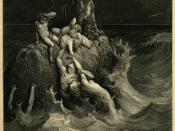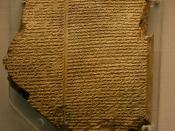Ultimate Redemption
Both The Epic of Gilgamesh and Genesis contain stories of a mass flood that is meant to wipe out humanity entirely, or almost entirely. The deluge is a result of the gods' or God's wrath. In both stories the flood is global, God or the gods intend to wipe out mankind, God or a god orders righteous man to build a large boat, take all species of animals to repopulate the earth, sends out birds to find land, makes sacrifices after the flood and is therefore blessed. It is obvious that the similarities between these two tales are too unbelievably exact to be coincidental. It's probable that this flood story was an oral tale that was handed down through generations. This means the fable and it's meaning must be highly significant. This story deals with highly important themes and lessons that the authors believe are necessary for humanity to be taught.
This is a story of ultimate power, mortality, righteousness and faith. Both Uta-napishti and Noah are blessed for their righteousness. Uta-napishti is made immortal and brought up to the level of the gods. The flood is included in Genesis to demonstrate God's ultimate power and his willingness to use it. Thanks to his covenant with Noah he will never exercise this power again as long as the covenant is not broken by either side, but it is important for humans to know he possesses said power nonetheless. Genesis's God is meant to be loved but more importantly feared. One must fear God's wrath, and live a righteous and sinless life in order to avoid it. Noah follows orders and maintains his faith and is justly rewarded. The flood is included in Gilgamesh for similar but not exactly analogous reasons. Enlil arbitrarily decides to wipe out the...


